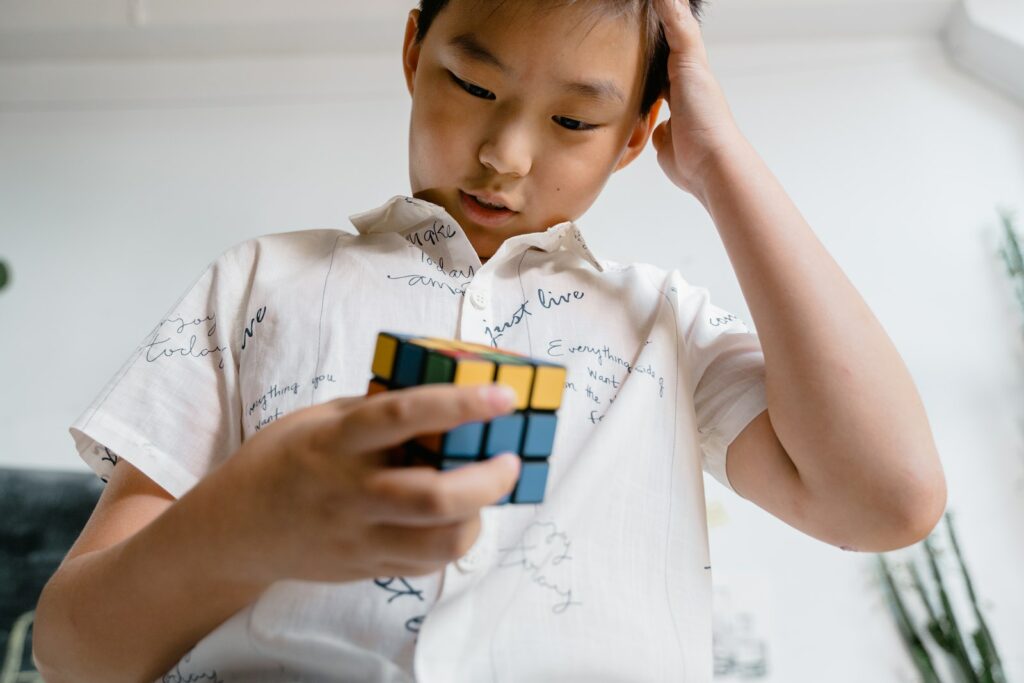Through real-life situations and games, we can stimulate children’s flexible thinking and help them develop problem-solving abilities by learning from their mistakes.

Many issues we adults find routine might be a whole new experience for our kids. So, our children face and tackle new problems every day. We can’t always be by their side or predict every challenge they’ll encounter. Thus, helping them develop proactive problem-solving skills becomes essential.
Letting Kids Face Challenges Head-On
Yes, sometimes our kids’ way of addressing problems can be all over the place, but that’s okay. It’s crucial for us to stand back and watch quietly. We should expect a bit of chaos. For example, when they’re learning to eat, there’s bound to be a mess everywhere. But as long as they aren’t getting hurt, it’s all part of the process. We need to understand that for them, these imperfect moments aren’t mistakes; they’re just steps in their learning journey.
Encouraging our kids to think on their own and be experimental is super important. If we can’t handle the mess or the time it takes and just give them the answer or even do it for them, it seriously hampers their ability to solve problems. It could even make them feel like we don’t trust their thinking. If our kids always see us anxious about them making mistakes, it’ll only put more pressure on them. Over-focusing on failures can make them resent even trying. Over time, they might start to avoid challenges or give up easily.
By observing from a distance, we can recognize and appreciate our children’s various skills. This helps us guide them when they face setbacks. We should focus on what our kids gain during the problem-solving process rather than the outcome.
Practical Problem-Solving
We can use everyday situations to practice problem-solving. For instance, pick a familiar route and let your child lead the way using public transportation, handling buying tickets, getting on and off. Discuss with them what to do if, say, the train is too crowded, and you get separated. Meet at the next stop? Ask station staff for help? Once they’ve got the hang of it, they’ll be able to apply these skills elsewhere.
Be a Role Model in Problem Solving
Whether we realize it or not, our kids are always watching us. They notice how we handle situations and often mimic our strategies. Problem-solving is a thought process, and sometimes our kids might not see our thought patterns. For kids not used to thinking things through, we should vocalize our thoughts, helping them understand the cause and effect.
Also, for those of us who always strive for perfection, it’s okay to let our kids see our mistakes. Involving them in finding solutions or even asking for their help can make them feel valued. They’ll understand that making mistakes isn’t necessarily bad but rather a chance to learn.
Offering Resources for Problem Solving
Fun, explorative learning can boost our kids’ creativity and flexibility. Give them materials like straws, tape, and toilet paper rolls, and see what they come up with! Familiarity with various materials can help them find innovative solutions to problems.
Guide Different Solutions
Break the stereotypes from storybooks. For instance, was trading her voice for legs the only way for Ariel to find happiness? Were there other ways to get the prince’s attention, or maybe she didn’t need the prince after all?
Cultivating Other Skills
- Cognitive Skills: Directly linked to problem-solving in child development. To solve a problem, kids need to analyze, integrate, and deduce information. They then strategize, compare, evaluate, choose a method, and refine it based on outcomes.
- Social Skills: Many problems arise from interpersonal conflicts. Our kids face these challenges daily, especially in preschool and primary school. They need to develop social skills. For more, check out Effective ways to cultivate communication skills: Parents’ Guide.
- Creativity: Unique ways to solve problems can tackle more challenges, building confidence and creating a positive loop. For more, see Effective Ways to foster Creativity: Parents’ Guide.
- Emotional Skills: If kids can find ways to stabilize their emotions when faced with problems, they can solve them faster. For further reading, Effective ways to enhance emotional development: Parents’ Guide.
Takeaways
Cultivating our children’s problem-solving skills is a crucial step in their growth journey. As parents, it’s beneficial to start by allowing our kids to tackle small challenges on their own, gradually building their confidence. Letting go doesn’t mean neglecting, but rather giving our children space to explore the world within safe boundaries. When they encounter difficulties, it’s best to guide them rather than directly providing the answers, encouraging them to think and joyfully face challenges.
We can use real-life scenarios and games to stimulate flexible problem-solving in our children, helping them build confidence from making mistakes and achieving success. Moreover, when we lead by example and become role models in tackling problems, our kids are better positioned to mimic and learn. This way, they can transform these invaluable experiences into courage and wisdom for future challenges.